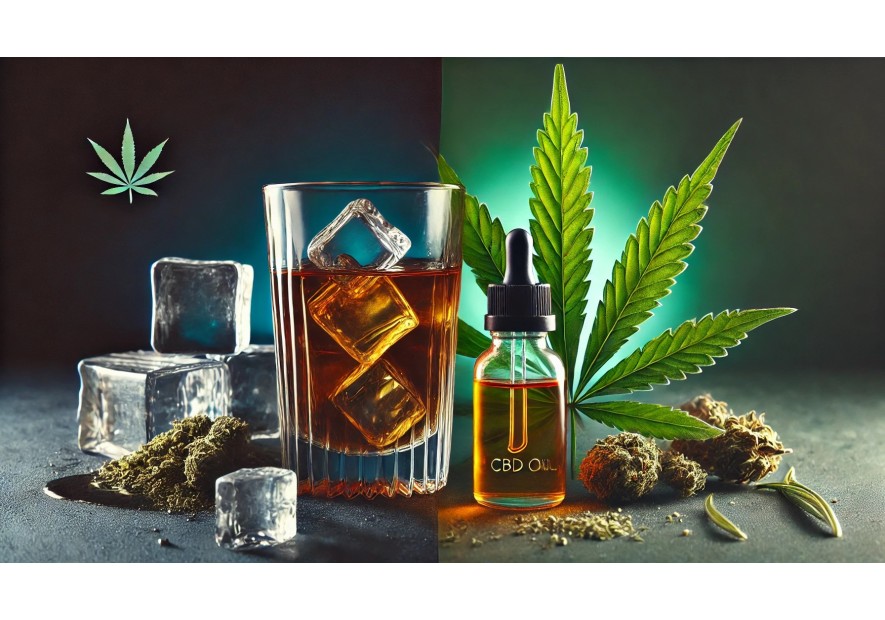Cannabis vs. Alcohol: A Comparison of Health, Society, and Economy

While alcohol is deeply rooted in many cultural traditions, cannabis, long stigmatized and illegalized, is re-emerging with new perspectives. As an advocate for cannabis, it’s crucial to compare these two substances from various angles to highlight why cannabis deserves a more central place, both in terms of health and socio-economic impact.
Health: A Comparative Approach to Risks
Alcohol is widely consumed worldwide, but its harmful effects are often underestimated. According to the World Health Organization (WHO), alcohol is responsible for approximately 3 million deaths per year, accounting for over 5% of global deaths. Its effects include severe diseases like cirrhosis, cancer, and long-term cognitive disorders. In comparison, cannabis poses significantly lower risks. While excessive use can cause respiratory or cognitive issues, the number of deaths directly linked to cannabis use is nearly zero. Moreover, there is no scientific evidence of cannabis overdose deaths, unlike alcohol.
Cannabis also stands out with CBD (cannabidiol), a non-psychoactive component known for its therapeutic benefits. CBD helps manage anxiety, chronic pain, and even disorders like epilepsy without causing addiction or severe side effects, unlike alcohol, which can lead to dependency even in small doses.
Perception of Danger: Alcohol vs. Cannabis
When discussing danger, it’s important to compare the numbers. In the United States, around 40% of violent crimes are related to alcohol consumption, according to the Bureau of Justice Statistics. Alcohol is also a major factor in road accidents, causing thousands of deaths each year. In contrast, cannabis, even when consumed recreationally, does not lead to such dangerous behaviors. On the contrary, it is often associated with a state of relaxation and stress reduction. This highlights a clear difference in the social impact of the two substances: alcohol tends to incite aggression and danger, while cannabis promotes calmness.
Economic Impact: The Benefits of Legalization
The legalization of cannabis has already demonstrated its economic impact in several regions worldwide. Take the United States, for example: in 2021, legal cannabis sales generated over $25 billion in revenue. A large portion of these funds is reinvested in public programs like education and infrastructure. In comparison, alcohol also generates significant revenue, but the associated social costs (public health, safety, etc.) absorb much of the benefits.
In terms of taxation, states where cannabis is legal are experiencing rapid growth in tax revenues. For instance, the state of Colorado has collected over $1.7 billion in taxes since legalization in 2014. In Europe, where several countries are considering legalization, projections show that the fiscal benefits of cannabis could rival or even surpass those of alcohol.
What Cannabis Brings to Society
The potential of cannabis far exceeds that of alcohol. In addition to its therapeutic virtues, cannabis can play a central role in reducing dependence on more harmful substances like alcohol or opioids. Numerous studies show that in regions where cannabis is legalized, there is a significant decrease in alcohol consumption, especially among young adults. Furthermore, creating a regulated cannabis industry brings new jobs, stimulates innovation, and contributes to diversifying the economy.
The Alcohol-Cannabis Mix: An Additional Risk
While alcohol and cannabis are often compared, their simultaneous consumption poses particular risks. This mix, sometimes called "crossfading," can amplify the adverse effects of both substances. Generally, alcohol increases the absorption of THC (the primary psychoactive component of cannabis), making the effects of cannabis stronger and more unpredictable. This can lead to dizziness, nausea, disorientation, or even anxiety attacks. Additionally, motor skills and perception are impaired far beyond what either substance would cause alone, significantly increasing the risk of accidents. Consumers should be aware that mixing these two substances heightens the dangers to their health and safety.
Conclusion
In comparing alcohol and cannabis, it is clear that the latter poses fewer public health risks while offering considerable economic and social benefits. It’s time to reassess our priorities and recognize cannabis’s potential as a safer and more beneficial alternative to alcohol. By adopting an informed approach, society could not only reduce the harms of alcohol but also reap the benefits that cannabis can offer.
